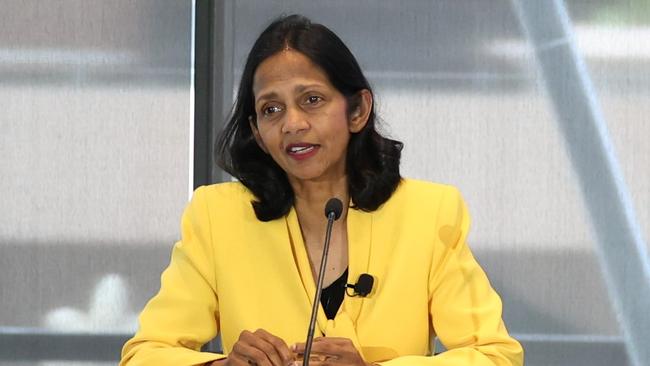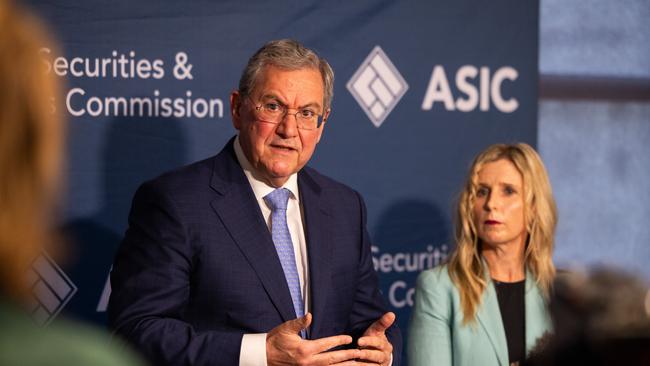Macquarie Group faces $500m in fines as ASIC alleges short trading reporting flop
ASIC’s latest case against Macquarie could result in the bank facing fines up to $500m. It is accused of letting millions of short trades spanning 321 listed securities go under-reported.

Business
Don't miss out on the headlines from Business. Followed categories will be added to My News.
Macquarie Group could face fines of $500m for more than a decade of misreporting short-selling positions, as the corporate regulator turned up the regulatory heat on the investment bank and accused it of hubris.
The Australian Securities & Investments Commission alleged that as many as 1.5 billion trades were wrongly characterised in mandatory disclosures, masking the extent of short-selling activity in the local market.
Short selling is a tool used by hedge funds to bet against the price of a security, such as shares.
ASIC said the ASX-listed financial giant racked up more than 14 years of reporting failures and “serious neglect of its systems”, in court filings in the NSW Supreme Court on Wednesday.
ASIC claims Macquarie’s IT systems aimed at identifying short sales lacked any filter to “identify inaccuracies” in the reports generated and supplied to the corporate regulator and the ASX.

This caused millions of trades across 321 listed securities to go underreported, with ASIC alleging the volume of short sales reported by Macquarie was incorrect by an average of 12 per cent over the period of offending.
As well, ASIC claimed Macquarie wrongly reported short sale volumes by up to 50 per or more on some occasions.
Financial licensees are legally required to report details of short interest to market operators the ASX and Cboe daily.
This data is used by investors and other market participants in a bid to understand the positioning against listed companies.
One senior investment industry figure said that without proper data “the whole system falls apart”.
ASIC chairman Joe Longo said Macquarie’s failure to fix its system, and its suggestion that by self-reporting the issue to the regulator at the tail end of 2022 the financial giant had sufficiently acted, conveyed a degree of complacency he was not comfortable with.
“Macquarie are a very successful institution, within the Australian economy and globally, they’re very highly regarded, they’re a significant player in our market,” Mr Longo said.
“Over the years what’s crept in here is a kind of hubris. They haven’t taken seriously enough what’s been raised with them and other regulators about their systems and processes and compliance.”
Mr Longo said until Macquarie took compliance more seriously, ASIC was “entitled to be a little more sceptical that things aren’t going to change”.
It is the fourth time ASIC has clashed with the bank in 12 months. Just last week, ASIC hit Macquarie with additional licence conditions, alleging it failed to stop misuse of its futures trading platform. Macquarie was accused of failing to prevent 11 suspicious bets on the electricity futures market after it had been dragged to the Markets Disciplinary Panel and fined almost $5m.
In the latest case, ASIC alleges Macquarie has systematically underreported the size and scope of short trades since 2009, as one of several mandatory changes introduced to the financial system in the wake of the Global Financial Crisis.

Mr Longo said the regulator’s intervention against Macquarie was “timely given significant recent global market volatility”.
“Accurate and reliable data underpins the integrity of, and confidence in, Australia’s financial markets,” he said.
Mr Longo said ASIC may seek a significant penalty depending on the outcome, with sources suggesting this may run as high as $500m.
“We think the number of contraventions is quite high,” Mr Longo said.
He also pointed to potential consequences for Macquarie executives – whose highest officer, CEO Shemara Wikramanayake, earned $24m last year – over the repeated regulatory actions.
ASIC is scoping out how it can use its powers under the Financial Accountability Regime. Mr Longo said there was “plenty of accountability to go round” at Macquarie, and the regulator was “constantly thinking about how we can get the benefits from the FAR”.
He added: “You can expect to hear more from us about it in the next year or two.”
University of Wollongong professor Andy Schmulow said ASIC lacked powers to take serious action under the FAR because it had been drawn up without punishments for breaches.
“ASIC has a gun without bullets,” Professor Schmulow said.
Commonwealth Bank CEO Matt Comyn said his lender had done a significant amount of work improving the bank’s trade surveillance and reporting.
CBA would “go and have a look at” its short sale reporting given the issue its competitor faced.
“I’m not specifically worried about anything from CBA’s perspective,” he said. “But you should never be complacent around where there’s real areas of complexity.”
Macquarie said it would review ASIC’s claims. “The reporting issues identified in the proceedings have been remediated with additional controls implemented,” a spokeswoman said.
“Macquarie takes its compliance obligations very seriously and continues to invest in programs to further improve systems and controls across the group.”
Macquarie shares fell 1.6 per cent on Wednesday to $211.85.
More Coverage
Originally published as Macquarie Group faces $500m in fines as ASIC alleges short trading reporting flop





